THE GUEST: Something’s Wrong With David & The Horrific Unknown
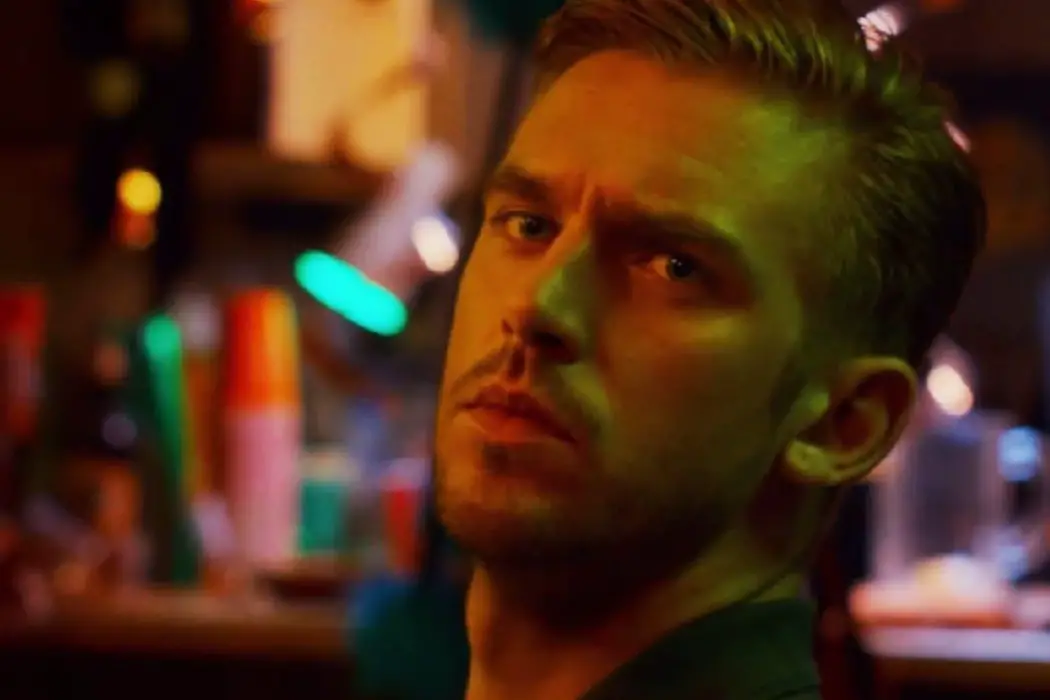
Brianna Zigler is a 23-year-old film journalist based in the…
When David Collins (Dan Stevens) first arrives at the front steps of the Peterson household, there’s no reason to turn him away. His handsome, boyish face and tousled blonde hair, seemingly ripped from the pages of a GQ issue, or a casting room for the lead love interest in a rom-com, is complemented not only by intensely blue eyes and a smile emanating only warmth, but by the simple fact that he’d been an army sergeant and good friend of the Petersons’ recently deceased son, Caleb, while the two of them were fighting in the war in Afghanistan. David stands in the doorway donning a grey hoodie and gripping the straps of his backpack, his grin accentuating the dimples in his cheeks and further cementing his imminent welcome into the Peterson’s home.
The Petersons, consisting of daughter Anna (Maika Monroe), son Luke (Brendan Meyer), mom Laura (Sheila Kelley) and dad Spencer (Leland Oscar), wracked with grief akin to an open wound, have a hard time saying no to the striking gentleman at their doorstep when he offers to assist them during this delicate time, which he claims was Caleb’s final wish. David knows that Caleb’s family is torn by the death of their only son, and has come to help them while they pick up the pieces left by the loss of their loved one. An innocent and overwhelmingly kind gesture towards a family still figuring out how to go on while embattled by their own sorrows.
But the warmth behind David Collins’ blue eyes conceals an effective nothingness, which creeps like a cancer when both piercing pupils are affixed blankly out the window of Caleb’s old room as David sits atop his bed, unmoving as a department store mannequin, focused, contemplating, planning his next move in a game that only he knows how to play – or maybe, doing nothing at all. You see, there is something not quite right about David, who is cheerful and personable, until he is not. His presence evokes an intentional calm yet lingers ever in the wake of unease. David is a person, but he is not human.
When David shoots Anna’s friends while purchasing firearms from them, he does it because, maybe, it’s just easier if they’re out of his way. When David quietly murders Spencer’s boss, allowing Spencer to get the promotion he’s always wanted, maybe he did it because he wanted to help a grieving father catch a break, or maybe because it was an open door he couldn’t resist. And when he slaughters Anna’s friend Kristen while waitressing at her job, doing away with all the patrons along with her by way of grenade, it’s because, as explained by military policeman Richard Carver (Lance Reddick), David couldn’t compromise his identity.
But what is David’s identity? And what exactly does he have to hide?
Who’s to really say. Maybe David Collins just likes to kill.
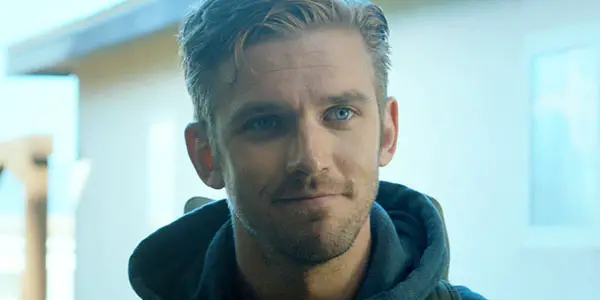
That’s the horror at the heart of David Collins, and the horror that encases Adam Wingard’s The Guest, like a net of crawling spider veins; David is no one, and simultaneously, anyone. His past is obscured, and his intentions are overwhelmingly unknown. He is harmless and handsome and horrifying all at the same time, an endless enigmatic void. His maiming and hurting do not seem to have a physical stopper which does not include killing him; but even death he manages to evade.
He is the unrelenting murdering machine boy-next-door, and if you f*ck him, he wants to find out where he can get some guns afterwards. “Who is David Collins?” is the question that The Guest asks us but never answers, and it’s the first layer of the cake that encompasses the mystery and terror of the Peterson’s guest, the man who calls himself David Collins but who should have been dead over a week ago. Things slips out, the mask falters a bit, a military policeman attempts to explain the inconceivable, but David and his intentions remain ever shrouded in ambiguity. “It would take too long to explain,” he tells Laura before he kills her, and so it never is.
David is the physical embodiment of the unnatural, the not quite right – of pervasive dread, uncertainty, and the looming terror of the unknown. What we don’t know will always scare us, and it is why David Collins is far less human and far more frightening than any Thing That Goes Bump in the Night.
Who is David Collins?
From the very first frame, the abnormalities of David are placed at the forefront. We’re brought into film with a shot from behind of David running down an empty dirt road, and a few minutes later when we’ve followed him to his destination, the Peterson house, we learn not only that he ran all the way from the bus stop he got off at, but that the bus stop is a significant distance from the Peterson’s. David says he needed the exercise (which, he clearly didn’t; later on, Anna gets so close to his bare chiseled abs she could practically lick off the condensation residue left from the shower he’s stepped out of), but it’s not even ten minutes into The Guest when we’re made aware in bits and pieces like a bread crumb trail that David is not a normal person.
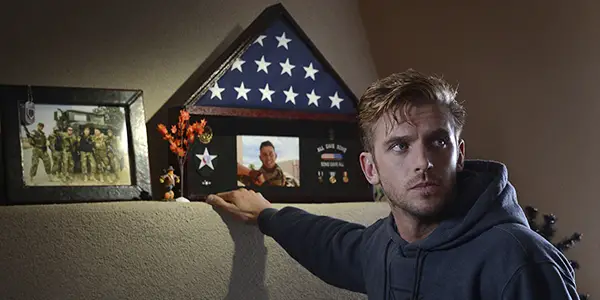
Finding a smiling David in a framed picture of Caleb and his squad members on the Peterson’s living room mantle abates audience and Laura’s uncertainty of whether to trust this man for a moment, but this temporary relief is snatched away after Laura has shown David to Caleb’s room and leaves him to rest. David instead chooses to sit on top of the made-up bed and stare, unblinking, out of the window. Then it’s his eyes that linger a little too long on Anna after he first meets her, or the fact that he can pound beers with no noticeable aftereffects; that he doesn’t require that much sleep, can carry two kegs of beer like they’re a pair of bookends, and can force himself erect at a moment’s notice. “Cash is easy to get” he says to Luke, when he reveals a wad of bills that he freely distributes at a bar, and gives Luke advice on defending himself where he lovingly suggests Luke burn his bullies houses down with their families inside.
And David’s disturbing behavior would be nothing without his charm, which is coupled by a delicate southern drawl and the oft-used “yes ma’am” – sugar substitute coating the outside of a black hole. It’s what makes David tenfold more terrifying, in the sweetness of his words and his actions, while the encroaching vacuum behind his eyes comparable to Christian Bale’s portrayal of Patrick Bateman in American Psycho. But unlike Patrick Bateman, David is nothing short of a gentleman. He defends Anna’s friend Kristen when her assumedly abusive ex-boyfriend crashes her Halloween party and attempts to yank her away; he beats up Luke’s bullies after noticing the bruise under Luke’s eye, and keeps Luke from getting expelled from school after Luke breaks a yardstick over a kid’s face for calling him a homophobic slur.
But David’s acts of kindness aren’t typical of any normal good Samaritan; he hurls Kristen’s ex’s face straight into a wall, smashing it against a glass picture frame; he gets back at Luke’s bullies by egging them on in a bar, then beating the ever-living shit out of them and blackmailing the bartender not to arrest him; and he blackmails Luke’s principal with a hate crime lawsuit, to get Luke’s given expulsion dropped down to a month’s worth of detentions instead.
It’s this combination of kindness and cruelty, of idiosyncrasies and deviance, that puts David at odds amidst the inhuman and the atypical before we learn that it is all those things at once, yet none of them at all. David carries with him a forced calm wherever he goes, which only serves to saturate an ever-present fog of foreboding that the man we see on our screen is not a man at all, but something else, something much more sinister that we do not understand. In this way, David is on par with the Uncanny Valley, the idea that an object which almost, but not quite, resembles a human being elicits feelings of eeriness and revulsion in those that look upon it.
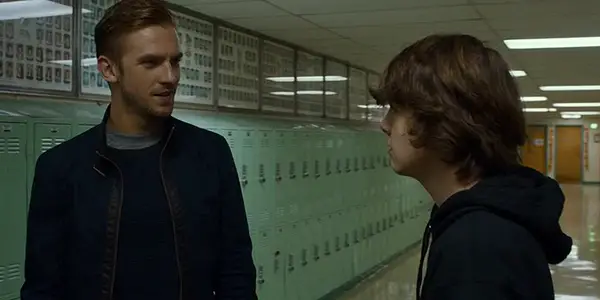
Thought most commonly used when talking about 3D animation and robotics, David similarly almost-but-not-quite resembles a human being not in regard to his appearance, but in his behavior. Even before The Guest parses out bits and pieces of David’s true nature, David is clearly an entity in the guise of a person; his actions and mannerisms are the make-believe dress up of a something that has learned the ways of people and can replicate them well, but not precisely. There’s a dance between human and inhuman, in almost knowing what he is but just not quite, that drags David’s very existence itself through eight layers of unease beyond what we learn about him and his origins.
What’s horrifying about the almost-human much more-so than what is outright not, is its ability to infiltrate our spaces so seamlessly, doing just enough to make your skin crawl for a second or two – but maybe it was all in your head. If Anna never made the call to the Fort Kenilworth military base, thereby revealing David Collins’ location and identity, David might have continued on with the Petersons behaving in ways that are not necessarily normal, but not downright wrong either. David’s unnoticed presence amongst other human beings, his overwhelmingly generous behavior at one moment and his ability to snap and toss a grenade into a restaurant at another, makes him more of a threat than any movie monster. You know the movie monster is coming to get you, but the Petersons never had the same luck.
A Riddle, Wrapped in a Mystery, Inside an Enigma
The true nature of David Collins exists in The Guest as a purposefully unsolvable puzzle; an amalgamation of clues and pieces that don’t quite fit, coming together to create a finished product that is just as confusing as if we didn’t have any of the pieces at all. If David’s not-quite-human self was already unsettling, it is only bolstered by the fact that his motivations and past are never fully revealed, even when it feels like we’ve come so close to discovering them.
It’s the fact that David Collins should have already been dead; it’s Anna’s overhearing of David on the phone, talking to someone about fingerprints and plastic surgery. Then there’s “the experiment,” which the original David Collins and Caleb were subjected to, at a hospital subsequently burned to the ground by David Collins, whoever that possibly was at the time; and Major Carver showing Anna a picture of David’s face, disclosing to her that that particular face and the name of David Collins are not one and the same. We learn that there was, in fact, a man by the name of David Collins in the army, but whoever that was and whoever is sleeping in Caleb’s bedroom are far and away. We know that there was a man with the fake David’s face who did serve with Caleb from the picture resting on the Peterson’s living room mantle, but the original owner of that face is long gone.
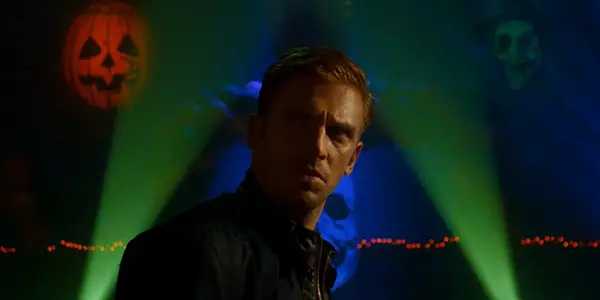
To further obscure things is to consider David’s purpose at the Peterson’s in the first place. Before David drives a carving knife into Laura’s gut, he tells her he truly wanted to help her and her family, but we are past the point where it’s all too apparent that we cannot trust David and anything he says or has said. His original claim that Caleb had wished for him to help his family after his death is marred by the possibility that Caleb never really knew this man, let alone if he had told David to do something like that as David burned him to death. This discovery causes any potential reasoning for coming to the Peterson’s aid in the first place to become entirely murky.
Confuse yourself even more by remembering that David went to purchase an entire truckful of guns and grenades even before Anna had called Fort Kenilworth and exposed him, thereafter ensuing his dire need for them. But if she had never called, what would he have needed all that firepower for? And even before things have started to fall apart, David checks his watch like he’d always been on a mission. The more evidence for the reality of David Collins that is given to us, the less sense everything seems to make.
Is the man masquerading as David Collins, the real David Collins with a different man’s face? Is he the man from Caleb’s photograph using the name of David Collins? Is he neither, but an unknown soldier with whom Caleb may have barely been acquainted, with a face and a name that do not belong to him at all? Is he, as many fans have hypothesized, actually Caleb?
There are so many people David could be to the point that he is nobody; a walking void with no real consequences to his actions or motivations to commit them at all. This lack of transparency is disturbing, to consider what kind of human could live an existence such as this and whether it is even a human at all. The questions and uncertainties that surround the man presented to us as David Collins form a cohesive vehicle for horror that many films are often too unwilling to use. Exposition and clarification must be dumped out to us by way of Skype chats and library visits because audiences must know, or they won’t care.
But the unknown itself is the ultimate horror movie monster. It is a void of endless possibility and terrifying potential, and to leave questions unanswered, with a lead character shrouded in ambiguity and an ending that robs you of any semblance of closure leaves audiences to reckon with their own imaginations. The unknown works hand in hand with our minds by scaring us with would could be rather than with what is. What could be, could be anything, and it could still be more horrifying than the most horrifying thing we could ever dream up with on our own.
Into the Unknown
The complex non-linear nature of David Lynch’s mystifying and unsettling work, in films such as Mulholland Drive, Eraserhead, and Lost Highway, has pushed irritated viewers for years to seek out any possible explanations, rather than consider what can come from leaving art open-ended. All those same years, Lynch has notoriously refused to give his audiences what they crave, because the subjectivity of art and the questions that it elicits are more thought-provoking than any answer from the artist. We are, in the end, too afraid to be truly afraid, and horror films that overly coddle our need for clarity rob us of the potential to face true terror. David Collins, agent of chaos, a tourist passing through this plane of existence, is the personification of our fear of the unknown and the refusal of artists like Lynch to give us all the answers as payment for a more affecting cinematic experience.
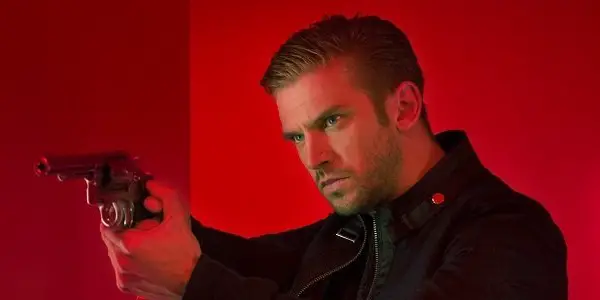
David Collins is scary because he could be anyone and anything, and we will never have the solution to the equation he is presented as. David is the unknown, and the empty chasm he leaves in the wake of his very existence as a character is what makes The Guest such compelling horror. The off-putting nature of David’s near-inhumanity is played in symbiosis with his incomprehensible origins, to create a character and film that are emboldened by their audacity to refuse us the truth.
David Collins gets under your skin in the same way he got under his own, shaping the bones in his face and the prints on his fingers to leave nothing but an untouchable enigma in place of a person. The horror of the unknown, the horror of David, the horror of The Guest, can all trace back to the one, simple question the film asks us and then leaves to fester in the void of our own, horrible minds: “Who is David Collins?”
Well, in his own words, he’s a friend of the family,
Maybe that’s all we need to know.
Have you seen The Guest? What are your thoughts about David Collins? Tell us your thoughts in the comments below!
Does content like this matter to you?
Become a Member and support film journalism. Unlock access to all of Film Inquiry`s great articles. Join a community of like-minded readers who are passionate about cinema - get access to our private members Network, give back to independent filmmakers, and more.
Brianna Zigler is a 23-year-old film journalist based in the Philadelphia suburbs and an alumni of Penn State University. She is a staff writer for Screen Queens, has bylines in Reel Honey Mag and Much Ado About Cinema, and has had a short story published in the horror literary journal Hinnom Magazine. She loves bad movies, Twin Peaks, and her pet parrot.













